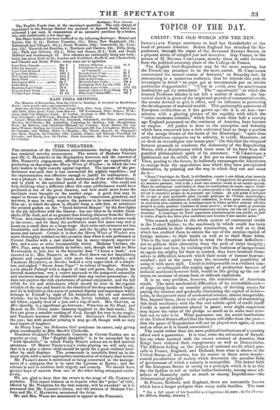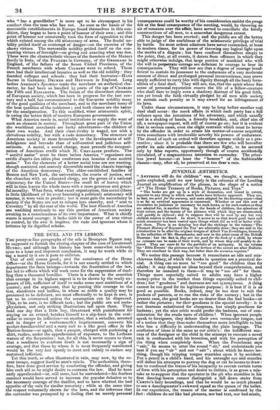TOPICS OF THE DAY.
CREDIT : THE OLD WORLD AND THE NEW.
IMMACULATE Europe continues to burl her thunderbolts at the head of peccant America. Sedate England has attacked the Re- pudiators, through the organ of the Reverend SYDNEY SMITH, its a piquant strain of mingled jest and invective. Gay France in the person of M. MICHEL CHEVALIER, attacks them in solid lectures from the political-economy chair of the College de France.
The English Anti-Repudiator may be the more amusing, but the French one promises to be the more useful. M. CHEVALIER commenced his annual course of lectures,* on Saturday last, by announcing to a numerous audience, that he intends this year to investigate in detail " un sejet vi se recommande par on merite particulier d'opportunite." " C eat le credit, avec les nombreuses institutions qui s'y rattachent." The " opportunite " to which the learned Professor alludes is not left a matter of doubt. An his- torical sketch is given of the origin and growth of commercial credit, the means devised to give it effect, and its influence in promoting the development of material wealth. This peristrephic panorama of European civilization as it has grown up—for it is no less—ter- minates with a glowing picture of the rapidity with which the " treize modestes colonies,' which little more than half a century ago England possessed on the continent of America, have become an empire. All justice is done to the enterprise and industry which have converted into a rich cultivated land so large a portion of the savage forests of the basin of the Mississippi : " maia dans cette laborieuse conquete sur la solitude, le credit, Messieurs, eat en droit de revendiquer une bonne part." On this hint the eloquent lecturer proceeds to condemn the dishonesty of the Repudiating States, with a decisiveness which loses none of its force from the guarded philosophical spirit of its utterance. "Si l'Amerique a habilement use du credit, elle a fini par en abuser etrangement." Then, passing to the future, he indirectly encourages the Americans to emerge from the opprobrium into which they have precipitated themselves, by pointing out the way in which they can and must do it— "Dana l'Amerique du Nord, la civilisation, encore son debut, s'est trouvee tout entire dans des conditions provisoires. L'empreinte du provisoire a dit s'y montrer partout ; tout a dfi y avoir une couleur locale at un cachet special. Bans lea entreprises materielles et dans lea institutions de touts espece deed- Dees isles activer, presque tout chez ce jeune peuple a ete aventureux, parceque tel eat le caracterc propre de la jeunesse qui s'essaie. Je n'ai point is mdiquer ici cc qua je puis pressentir pour l'avenir politique de l'Union Americaine; mats, quaint aux institutions de credit industrial, je tiens pour certain qu'ellea ne sanraient plus subsister en Amerique sous la forme qu'elles avaient affectee jusqu'it ce jour, pendant l'enfance de cette societe ; at stir ce point, ie pourraiff iuvoquer l'opinion present° des Americains eux-memes, car elle eat a pen pres unanime. L'Amerique du Nord organisers prochainement son credit, on dolt Is croire, d'apres des idees plus conformes aux besoins d'une societe assise."
This remark applies to the whole system of commercial credit in the United States ; to the machinery by which credit has been made available in their domestic transactions, as well as to that which has enabled them to obtain the use of the surplus capital of foreign nations ; to their banks as well as to their State debts. This is the true spirit in which to treat the American defaulters : not to palliate their aberration from the path of strict integrity; but to point out how' by wielding with the rashness of inexperience an agent too mighty for them to control, they have involved them- selves in difficulties beneath which their sense of honour hasesuc- cumbed ; and at the same time the necessity and possibility of using it with more skill. Credit is indispensable to a civilized com- munity: to relinquish this mighty agent of production because of isolated accidents however fatal, would be like giving up the use of steam on account of steam-boat or railroad explosions.
It is no easy problem, however, the restoration of American credit. The mere mechanical difficulties of its reestablishment— of organizing banks on sounder principles, of devising means for paying the interest and gradually eliminating the capital of debts— seem, in the present state of economical science, almost insuperable. But, beyond these, there is the still greater difficulty of reanimating this dead machinery with the fine and subtile spirit of credit itself. Credit is moral character placed in pawn : even slight suspicions may injure the value of the pledge so much as to make men reso- lute not to take it in. What guarantee can the social institutions of the United States afford that the future will differ from the past— that the game of Repudiation will not be played over again, as soon and as often as it is found convenient ?
The social rather than the mere political institutions of a country afford such a guarantee. It is true, what the advocates of Repub- lica say when taunted with the recent conduct of America, that Kings have violated their engagements as well as Democracies. The different feeling on the subject of national credit which pre- vails in France, England, and Holland, from what is shown in the United States of America, has its source in those more deeply- rooted peculiarities of society which determine the peculiar form of government of which a country is susceptible. The better faith of the European States is owing to a principle which it is at this day the fashion to rail at rather indiscriminately, among some ad- mirers of Monarchy quite as much as among Republicans—the Aristocratical principle. In France, Holland, and England, there are mercantile houses which have a longer pedigree than many noble families. The man
* See a full report of his beautiful and ingen:ous &mum:, in the Journa des Debats, Sunday, January 7. who " has a grandfather" is more apt to be circumspect in his conduct than the man who has not. As soon as the heads of the mercantile establishments in Europe found themselves in this con- dition, they began to have a point of honour of their own ; and this point of honour not unnaturally took the form of opposition to that which existed among the old aristocracy of arms. The feudal no- bility prided itself on contempt of danger—on the exercise of the showy virtues. The mercantile nobility prided itself on the con- trasting virtues of foresight—on giving and exacting what was due. These were the characteristic virtues of the founders of the MEDICS family in Italy, of the FUGGERS in Germany, of the GRESHAMS in England, of the fathers of the Seven United Provinces, of the French merchants with whom COLBERT went to school. These men had their intellectual luxuries as well as the old nobility : they founded colleges and schools : they had their laureates—Hugs SACHS in Germany, DECKER and HEYWOOD in England. Long before ADDISON'S Spectator made the merchant an wsthetical cha- racter, he had been so handled by poets of the age of CHARLES the Fifth and ELIZABETH. The fusion of the discordant elements of European society, which has been in progress for the last cen- tury and a half, has communicated to the European nobility many of the good qualities of the merchant, and to the merchant many of the best qualities of the nobleman ; and both classes are the batter for the amalgamation. To this modified, wiser aristocratic spirit, is owing the better faith of modern European governments. What America needs is, social institutions to supply the want of such an element in society. Throughout great part of the Union the wealthiest merchants are lucky adventurers—the children of their own works. And their class-rivalry is waged, not with a chivalrous nobility, but with a rude democracy. The structure of American society is more favourable to the development of self- indulgence and bravado than of self-control and judicious self- estimate. A moral, a social change, must precede the reorgani- zation of American credit which M. CHEVALIER predicts. The " societe assise" must be there before America " organisera son credit d'apres des idees plus conformes aux besoins d'une societe assise." Yet the elements of a better social tone are not wanting, though scattered and scarcely discernible amid the chaotic heavings of the American democracy. The older-established families of Boston and New York, the universities, the courts of justice, and the churches with an educated clergy, are the germs of a national aristocracy for the United States—the small bit of leaven which will in time leaven the whole mass with a more generous and grace- ful morality. What form, what exact organization, this social (there is little likelihood of its ever becoming a political) aristocracy will assume, it were vain to predict; but it must gain the ascendancy in society if the States are not to relapse into anarchy, and " sent to Coventry" by all the rest of the world. The best friends of America are watching anxiously to see this portion of American society awaking to a consciousness of its own importance. What it chiefly wants is moral courage : it lacks faith in the power of true virtue to control, by the awe it inspires, the rude and ignorant whom it irritates by its dignified rebuke.



























 Previous page
Previous page